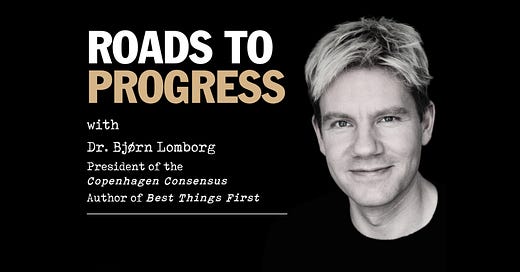Can Democracy Become More Rational? A Conversation with Author and Researcher Dr. Bjørn Lomborg
YouTube | Apple Podcast | Spotify | Buzzsprout | Website
There’s something unmistakably toxic in today’s politics.
Pick the issue, and its online offshoots are likely to be oversimplified, black-and-white shouting matches in which self-proclaimed heroes moralize against evildoers on their way to influence and clout.
The culture war is much more than a bunch of debates – it’s now a perpetual battleground where games of power and career trajectories play out.
We’ve become a live illustration of why Plato was so skeptical about democracies. In his Republic, he argued that fickle and impulsive populations don’t lead to effective government. More often, they encourage the rise of careerist politicians specializing in manipulation and demagoguery.
In his analogy, democratic leaders aren’t the best ship captains: they’re just the ones who can best convince non-sailers that they are.
Even so, there’s no intrinsic reason why public issues couldn’t be analyzed more rationally, in light of the best evidence.
My guest in this episode of the podcast – Dr. Bjørn Lomborg - has made a career demonstrating this.
He was once, in his words, a backpack-wearing Greenpeace-style idealist. He’d bought into a familiar story: the world was headed toward an environmental disaster, and radical change was needed to avoid an impending catastrophe.
When he was already a tenured professor, he discovered the work of American economist Julian Lincoln Simon. Foreshadowing Steven Pinker’s argument in Enlightenment Now, Simon argued that notwithstanding the popular doomsday predictions, the world was actually improving in important and measurable ways: natural resources were becoming less scarce, pollution in the US had been decreasing, the world’s food supply was increasing, and population growth had long-term benefits.
To his would-be detractors, Simon issued a simple, four-word challenge, one Dr. Lomborg would take seriously: “Go check the data”.
Along with a few of his students, Dr. Lomborg did exactly that. And while he found a few minor issues with Simon’s work, he was surprised when the bulk of it actually withstood scrutiny. His mind had changed, and so had his approach to analyzing complex global issues.
“Go check the data”.
These words would echo like a mantra throughout a journey that would see Dr. Lomborg named as one of TIME magazine’s 100 most influential people in the world, a top 100 public intellectual by Foreign Policy and Prospect magazines, and as one of the 50 people who could save the planet by the UK’s Guardian newspaper.
He founded the Copenhagen Consensus in 2002, a think tank dedicated to finding cost-effective solutions to the world’s biggest challenges using a data-driven approach. To conduct its studies, it has enlisted over 300 economists from internationally renowned institutions, including seven Nobel laureates.
One might say it's become a logical counterpoint to the sensationalistic, colour-blind bloodsport that passes for political analysis these days.
In this spirit, some have magnified Dr. Lomborg’s findings to dismiss him as yet another climate “denialist.” Nothing could be further from the truth. In our interview, he plainly admits to wholesale subscribing to the UN Climate Panel’s findings: they just acknowledge global warming while not subscribing to the “impending climate apocalypse” hypothesis, either. Instead, his research takes issue with the expensive and as-yet ineffective measures Western governments are adopting to fight climate change.
Foreign Policy may have lauded him for “taking the black and white out of climate politics” – but clearly, many are still attached to their blacks and whites.
His studies also uncover surprising opportunities for massive progress which rarely register on the radar of electoral politics: things like improving the nutrition of newborns in poor places, digitizing the bidding process for government contracts, or increasing the use of self-learning tablets in schools. Some of the best “ROI” policies – bringing back tens of dollars in benefits for every dollar spent - may just be too pedestrian to satisfy the bloodthirsty ethos of the culture war.
His work confronts us with a recurrent question at every turn: are we interested in entertaining outrage or in actually solving problems?
Dr. Lomborg is diligently paving new roads to progress on the most challenging issues we face. In doing so, he’s outlining a politics of reason we seem far from mature enough to pursue as a culture.
Agree or disagree, his call is to suspend our gut reactions, and start by checking the data.
You can start by checking out this short clip, on how having too many goals – something politicians who “promise the world” often do – can actually hurt effective action.



